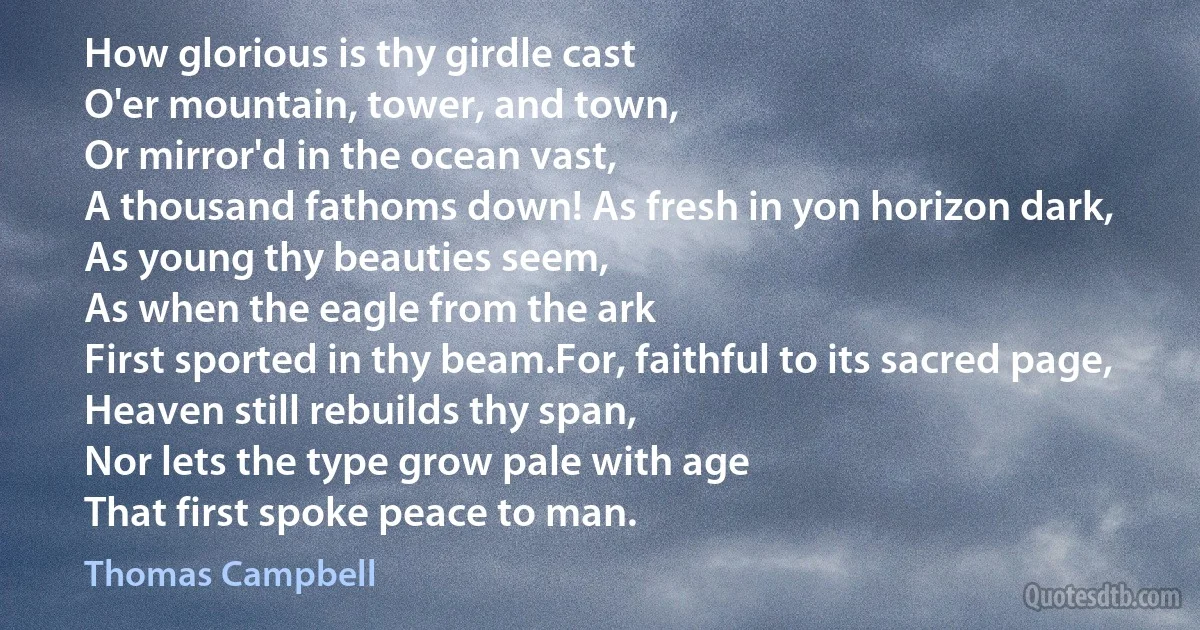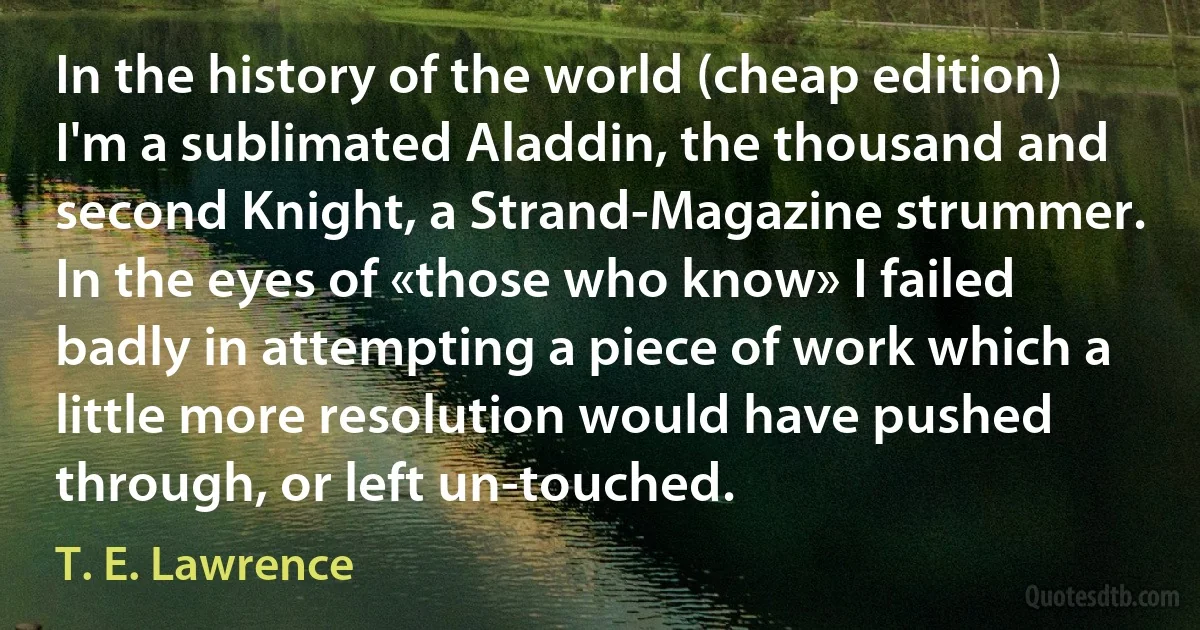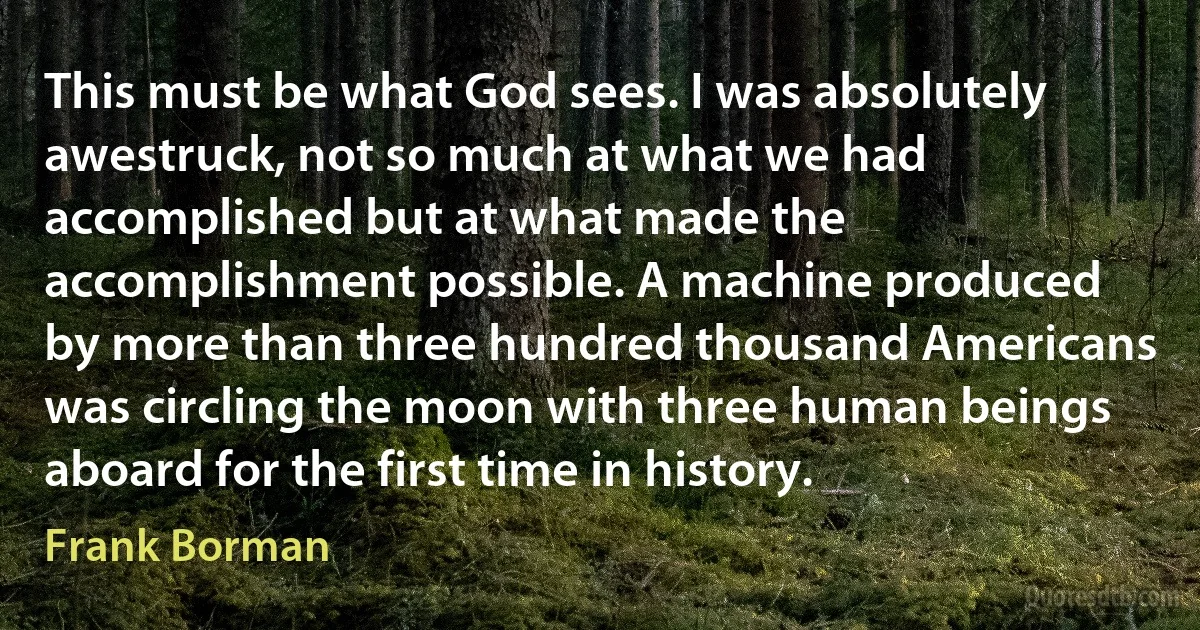Thousand Quotes - page 85
Ilyas Shah of Bengal (1339-1379 AD) invaded Nepal and destroyed the temple of Svayambhunath at Kathmandu. He also invaded Orissa, demolished many temples, and plundered many places. The Bahmani sultans of Gulbarga and Bidar considered it meritorious to kill a hundred thousand Hindu men, women, and children every year. They demolished and desecrated temples all over South India.

Sita Ram Goel
The success of England and her allies in the War of the Spanish Succession, which curbed "the exorbitant power of France" for eighty years to come, influenced the whole tone of Eighteenth Century civilization in a thousand ways. The defeat of Louis is one of the most prominent facts in history. We are, therefore, apt to forget how very near he came to attaining world-power, by the retention of the whole Spanish Empire as a field of French influence, and by the virtual annexation of the Netherlands and of Italy as jewels in the French Crown. He was never nearer to success than in the spring of 1704. Nothing but the accident of Marlborough's genius, and some lucky turns of fortune in the field that year, diverted the paths of destiny.

G. M. Trevelyan
The Chinese people have always cherished goodwill towards the American people. In 1784, U.S. merchant ship, Empress of China, sailed to China, opening the friendly exchanges between our two peoples. In mid 19th century, several dozen thousand Chinese workers, working side-by-side with American workers and braving harsh conditions, built the great railway linking the East and the West of the American continent.

Hu Jintao
There are over seventeen thousand golf courses in America. They average over one hundred and fifty acres a piece – that's three million plus acres, four thousand, eight hundred and twenty square miles – you could build two Rhode Islands and a Delaware for the homeless on the land currently being wasted on this meaningless, mindless, arrogant, elitist, racist-there's another thing; the only blacks you'll find at country clubs are carrying trays-and a boring game. A boring game for boring people. You ever watch golf on television? It's like watching flies fuck! And a mindless game, too.

George Carlin
My heart grieves when I think about the situation in the Middle East. I've worked very hard on this for two years, and for years before that. But trust is broken down. We have to do everything we can in our power - all of us, the United States, the European Union, any other nation that has the ability to influence the situation in the Middle East - to work with the Palestinians to put in place a leadership that is responsible, with representative institutions of government that will clamp down on terrorism, that will say to its people, "Terrorism is not getting us anywhere. It is not producing what we want: a Palestinian state. It is keeping us away from a Palestinian state."
And we also have to say to our Israeli friends that you have to do more to deal with the humanitarian concerns of the Palestinian people, and you have to understand that a Palestinian state, when it's created, must be a real state, not a phony state that's diced into a thousand different pieces.

Colin Powell
I started publishing small poetry plaquettes. They were about 200 copies. Then I went up to 2 thousand and now I have reached 20 thousand. Last week a publisher suggested that I publish my books in a collection that runs 100,000 copies. I refused: what I want is to return to the 200 from the beginning.

Henri Michaux
The population of these Pueblos will average nearly five hundred souls each (though some hardly exceed one hundred), making an aggregate of nine or ten thousand. At the time of the original conquest, at the close of the sixteenth century, they were, as has been mentioned, much, perhaps ten-fold, more numerous. Ancient ruins are now to be seen scattered in every quarter of the territory: of some, entire stone walls are yet standing, while others are nearly or quite obliterated, many of them being now only known by their names which history or tradition has preserved to us.

Josiah Gregg
[M]en must be governed by those laws which they love. Where thirty millions are to be governed by a few thousand men, the government must be established by consent, and must be congenial to the feelings and to the habits of the people. That which creates tyranny is the imposition of a form of government contrary to the will of the governed: and even a free and equal plan of government, would be considered as despotic by those who desired to have their old laws and their ancient system.

Edmund Burke
One example of these kinds of statistics comes from Evolution: Possible or Impossible by James F. Coppedge [who] cites an article by Ulric Jelinek ... which claims that the odds are 1 in 10^243 against "two thousand atoms" (the size of one particular protein molecule) ending up in precisely that particular order "by accident." Where did Jelenik get that figure? From Pierre Lecompte du Nouy... who in turn got it from Charles-Eugene Guye, a physicist who died in 1942. Guye had merely calculated the odds of these atoms lining up by accident if "a volume" of atoms the size of the Earth were "shaken at the speed of light," failing to factor in laws of chemistry, which create preferences for the formation and behavior of molecules, and ignoring that there are millions if not billions of different possible proteins. This calculation comes to Coppedge third-hand, and is now outdated (it was calculated before 1942, even before the discovery of DNA).

Pierre Lecomte du Noüy
Just as we cannot stop the movement of the heavens, revolving as they do with such speed, so we cannot restrain our thought. And then we send all the faculties of the soul after it, thinking we are lost, and have misused the time that we are spending in the presence of God. Yet the soul may perhaps be wholly united with Him in the Mansions very near His presence, while thought remains in the outskirts of the castle, suffering the assaults of a thousand wild and venomous creatures and from this suffering winning merit. So this must not upset us, and we must not abandon the struggle, as the devil tries to make us do. Most of these trials and times of unrest come from the fact that we do not understand ourselves.

Teresa of Ávila
I can't even think about this movie. I don't WANT to think about it because if I think about it I will have to face an ugly truth that has been gnawing through my head...
This started out as a documentary on gun violence in America, but the largest mass murder in our history was just committed - without the use of a single gun! Not a single bullet fired! No bomb was set off, no missile was fired, no weapon (i.e., a device that was solely and specifically manufactured to kill humans) was used. A boxcutter! - I can't stop thinking about this. A thousand gun control laws would not have prevented this massacre. What am I doing?

Michael Moore
Against this background, it is not so strange anymore that Indian Marxists have become zealous defenders of a colonial-originated thesis about ethnic movements of four thousand years ago, simply because that thesis is functioning as the war-horse of the united anti-Hindu forces. The greying Indian Marxists are trying to widen their shrinking base by uniting with forces they would once have denounced as obscurantist and populist-retrograde.

Koenraad Elst
In his short life of thirty-two years Shankara achieved that union of sage and saint, of wisdom and kindliness, which characterizes the loftiest type of man produced in India... There is much metaphysical wind in these discourses, and arid deserts of textual exposition; but they may be forgiven in a man who at the age of thirty could be at once the Aquinas and the Kant of India... Shankara establishes the source of his philosophy at a remote and subtle point never quite clearly visioned again until, a thousand years later, Immanuel Kant wrote his Critique of Pure Reason... We do not know how much Parmenides' insistence that the Many are unreal, and that only the One exists, owed to the Upanishads, or contributed to Shankara; nor can we establish any connection, of cause or suggestion, between Shankara and the astonishingly similar philosophy of Immanuel Kant.

Adi Shankara
This City in Ukraine was once Home to almost 50 thousand people. It had everything a community would need for a comfortable life. But on the 26th of April 1986, it suddenly became uninhabitable. The nearby Nuclear Power Station of Chernobyl exploded. And less than in 48 hours the city was evacuated. No one has lived here since.

David Attenborough
I soon had a few thousand people I didn't know sending me messages like "OMG! Is it really you?” "I love it when old ladies blog,” one early follower remarked. ... and they really shone when, during the Olympics, I said that "Own the podium" was too brash to be Canadian, and suggested "A podium might be nice." Their own variations poured onto a feed tagged #cpodium: "A podium! For me?" "Rent the podium, see if we like it." "Mind if I squeeze by you to get onto that podium?" I was so proud of them! It was like having 33,000 precocious grandchildren!

Margaret Atwood
Paradis, possessed by his notion, waved his hand towards the wide unspeakable landscape. and looking steadily on it repeated his sentence, 'War is that. It is that everywhere. What are we, we chaps, and what's all this here? Nothing at all. All we can see is only a speck. You've got to remember that this morning there's three thousand kilometers of equal evils, or nearly equal, or worse."
"And then," said the comrade at our side, whom we could not recognize even by his voice, "to-morrow it begins again. It began again the day before yesterday, and all the days before that!"

Henri Barbusse
It terrifies one to think for how short a time science has been methodical and of useful industry; and after all, is there anything on earth more marvelously easy than destruction? Who knows the new mediums it has laid in store? Who knows the limit of cruelty to which the art of poisoning may go? Who knows if they will not subject and impress epidemic disease as they do the living armies - or that it will not emerge, meticulous, invincible, from the armies of the dead? Who knows by what dread means they will sink in oblivion this war, which only struck to the ground twenty thousand men a day, which has invented guns of only seventy-five miles' range, bombs of only one ton's weight, aeroplanes of only a hundred and fifty miles an hour, tanks, and submarines which cross the Atlantic? Their costs have not yet reached in any country the sum total of private fortunes.

Henri Barbusse
Real awareness comes intermittently, in brief flashes of a second's duration. The man who can hold it for a minute, relatively speaking, inevitably changes the whole trend of the world. In the span of ten or twenty thousand years a few widely isolated individuals have striven to break the deadlock, shatter the trance, as it were. Their efforts, if we look at the present state of the world superficially, seem to have been ineffectual. And yet the example which their lives afford us points conclusively to one thing, that the real drama of men on earth is concerned with Reality, and not with the creation of civilizations which permit the great mass of men to snore more or less blissfully. A man who wanted to live would not waste even a fraction of a moment in the invention, creation and perpetuation of instruments of death.

Henry Miller
Let us here return to the sublime conjecture of Franklin, that "mind will one day become omnipotent over matter.” If over all other matter, why not over the matter of our own bodies? If over matter at ever so great a distance, why not over matter which, however ignorant we may be of the tie that connects it with the thinking principle, we always carry about with us, and which is in all cases the medium of communication between that principle and the external universe? In a word, why may not man be one day immortal?
The different cases in which thought modifies the external universe are obvious to all. It is modified by our voluntary thoughts or design. We desire to stretch out our hand, and it is stretched out. We perform a thousand operations of the same species every day, and their familiarity annihilates the wonder. They are not in themselves less wonderful than any of those modifications which we are least accustomed to conceive. - Mind modifies body involuntarily.

William Godwin
The Persian ruler Nadir Shah, in his invasion of India in 1738, killed some 200,000 people and returned with a huge quantity of booty and a large number of slaves, including a few thousand beautiful girls. Alain Danielou (d. 1994), French scholar of Indian philosophy, religion, history and arts, described Nadir Shah's assault of Delhi as follows: ‘...for a week his soldiers massacred everybody, ransacked everything, and razed the entire countryside, so that the survivors would have nothing to eat. He went back to Iran taking with him precious furniture, works of art, horses, the Kohinoor diamond, the famous Peacock throne, and 150 million rupees in gold.'

Nader Shah
The third general fact on which this theory is founded, is, that the stratified rocks, instead of being either horizontal, or nearly so, as they no doubt were originally, are now found possessing all degrees of elevation, and some of them even perpendicular to the horizon; to which we must add, that those strata which were once at the bottom of the sea are now raised up, many of them several thousand feet above its surface. ...This force, which has burst in pieces the solid pavement on which the ocean rests, and has raised up rocks from the bottom of the sea, into mountains... exceeds any which we see actually exerted, but seems to come nearer to the cause of the volcano or the earthquake than to any other, of which the effects are directly observed. The immense disturbance, therefore, of the strata, is in this theory ascribed to heat acting with an expansive power, and elevating those rocks which it had before consolidated.

James Hutton



